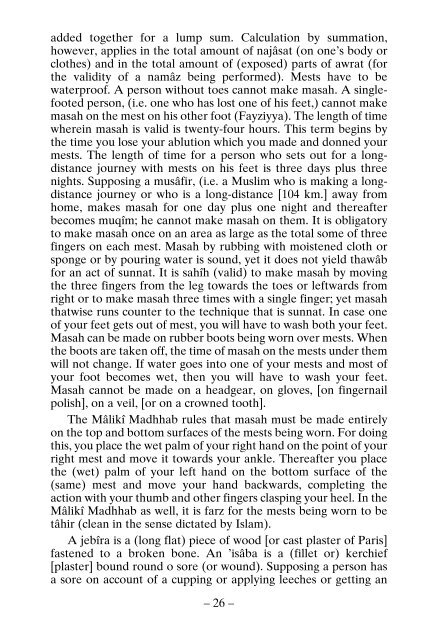O Son !
THE BOOK ‘O SON’ Al-hamdu lillâhi Rabbil ’âlamîn. Wa-s-salâtu wa-s-salâmu ’alâ Rasûlinâ Muhammadin wa Âlihi wa Sahbihi ajma’în. 1– O son! Collecting from books written by the scholars of the Hanafî Madhhab three hundred and sixty hadîth-i-sherîfs and forty-four khabars and also the seven essentials and the five rukns and the seven wâjibs and the fourteen sunnats and the twenty-five mustahabs and the fourteen mufsids of namâz, I have explained them for you. Adapt your acts and deeds to these teachings so that you attain fayz and nejât (salvation)! 2– Also for your information, I have collected a thousand and ninety âdâb (adabs) for you and for other young Muslims like you. If you adapt your actions and acts of worship to these teachings, they will be sufficient for you. If you laze, disobey Allâhu ta’âlâ and cease from these practices and manners, you will be afflicted with slavery and disgrace in the world and subjected to torment in the world to come. If you live up to them and advise your Muslim brothers to do the same, it will be useful for you. They will say blessings over you. And Haqq ta’âlâ will accept their invocations. For, a slave will be pardoned on account of another slave’s invocations for them.
THE BOOK ‘O SON’
Al-hamdu lillâhi Rabbil ’âlamîn. Wa-s-salâtu wa-s-salâmu ’alâ
Rasûlinâ Muhammadin wa Âlihi wa Sahbihi ajma’în.
1– O son! Collecting from books written by the scholars of the
Hanafî Madhhab three hundred and sixty hadîth-i-sherîfs and
forty-four khabars and also the seven essentials and the five rukns
and the seven wâjibs and the fourteen sunnats and the twenty-five
mustahabs and the fourteen mufsids of namâz, I have explained
them for you. Adapt your acts and deeds to these teachings so that
you attain fayz and nejât (salvation)!
2– Also for your information, I have collected a thousand and
ninety âdâb (adabs) for you and for other young Muslims like you.
If you adapt your actions and acts of worship to these teachings,
they will be sufficient for you. If you laze, disobey Allâhu ta’âlâ
and cease from these practices and manners, you will be afflicted
with slavery and disgrace in the world and subjected to torment in
the world to come.
If you live up to them and advise your Muslim brothers to do
the same, it will be useful for you. They will say blessings over you.
And Haqq ta’âlâ will accept their invocations. For, a slave will be
pardoned on account of another slave’s invocations for them.
You also want an ePaper? Increase the reach of your titles
YUMPU automatically turns print PDFs into web optimized ePapers that Google loves.
added together for a lump sum. Calculation by summation,<br />
however, applies in the total amount of najâsat (on one’s body or<br />
clothes) and in the total amount of (exposed) parts of awrat (for<br />
the validity of a namâz being performed). Mests have to be<br />
waterproof. A person without toes cannot make masah. A singlefooted<br />
person, (i.e. one who has lost one of his feet,) cannot make<br />
masah on the mest on his other foot (Fayziyya). The length of time<br />
wherein masah is valid is twenty-four hours. This term begins by<br />
the time you lose your ablution which you made and donned your<br />
mests. The length of time for a person who sets out for a longdistance<br />
journey with mests on his feet is three days plus three<br />
nights. Supposing a musâfir, (i.e. a Muslim who is making a longdistance<br />
journey or who is a long-distance [104 km.] away from<br />
home, makes masah for one day plus one night and thereafter<br />
becomes muqîm; he cannot make masah on them. It is obligatory<br />
to make masah once on an area as large as the total some of three<br />
fingers on each mest. Masah by rubbing with moistened cloth or<br />
sponge or by pouring water is sound, yet it does not yield thawâb<br />
for an act of sunnat. It is sahîh (valid) to make masah by moving<br />
the three fingers from the leg towards the toes or leftwards from<br />
right or to make masah three times with a single finger; yet masah<br />
thatwise runs counter to the technique that is sunnat. In case one<br />
of your feet gets out of mest, you will have to wash both your feet.<br />
Masah can be made on rubber boots being worn over mests. When<br />
the boots are taken off, the time of masah on the mests under them<br />
will not change. If water goes into one of your mests and most of<br />
your foot becomes wet, then you will have to wash your feet.<br />
Masah cannot be made on a headgear, on gloves, [on fingernail<br />
polish], on a veil, [or on a crowned tooth].<br />
The Mâlikî Madhhab rules that masah must be made entirely<br />
on the top and bottom surfaces of the mests being worn. For doing<br />
this, you place the wet palm of your right hand on the point of your<br />
right mest and move it towards your ankle. Thereafter you place<br />
the (wet) palm of your left hand on the bottom surface of the<br />
(same) mest and move your hand backwards, completing the<br />
action with your thumb and other fingers clasping your heel. In the<br />
Mâlikî Madhhab as well, it is farz for the mests being worn to be<br />
tâhir (clean in the sense dictated by Islam).<br />
A jebîra is a (long flat) piece of wood [or cast plaster of Paris]<br />
fastened to a broken bone. An ’isâba is a (fillet or) kerchief<br />
[plaster] bound round o sore (or wound). Supposing a person has<br />
a sore on account of a cupping or applying leeches or getting an<br />
– 26 –

















